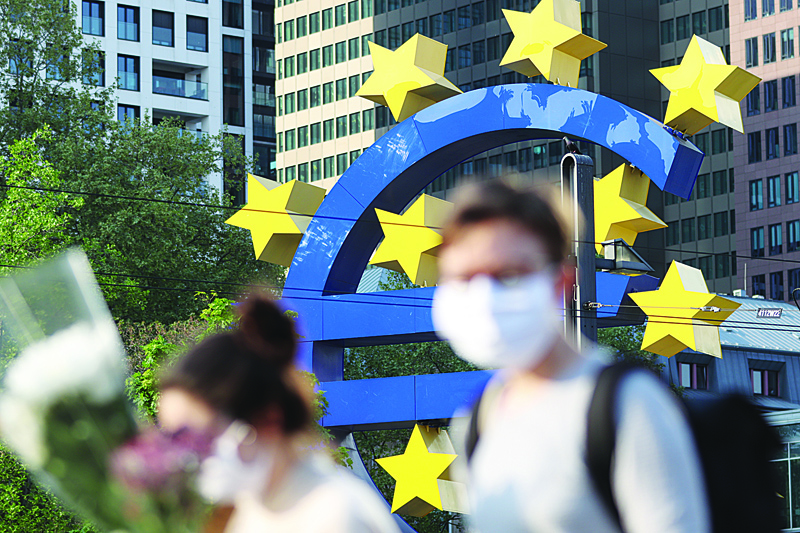

FRANKFURT: The European Central Bank left policy unchanged yesterday but with the economic recovery losing momentum and a strong euro dampening inflation expectations, ECB President Christine Lagarde is expected to set the stage for more stimulus later. Having pulled out the stops this spring to halt a historic economic decline across the 19-country currency bloc, the ECB has time to let governments implement their own countermeasures and for its own ultra-easy policy to seep into the real economy.
But hurdles to the rebound from a 12 percent output drop in the second quarter are proving bigger than expected, and economists say the ECB will have to take more action, possibly in December. "The Governing Council continues to stand ready to adjust all of its instruments, as appropriate, to ensure that inflation moves towards its aim in a sustained manner, in line with its commitment to symmetry," the ECB said after a widely expected decision.
The problem is that fresh data point to waning investor and consumer confidence amid a resurgence in coronavirus infections, with many fearing fresh restrictions on ordinary life. But more importantly for the ECB, inflation has turned negative, raising the risk that longer term price growth expectations also take a hit, leading to a hard-to-reverse downward spiral. This is crucial for the ECB, which has undershot its nearly 2 percent inflation target for the past seven years, casting doubt on the credibility of a policy suite that is radical, yet fails to achieve its objective.
Compounding the problem, the euro has firmed 8 percent against the dollar, eroding export competitiveness and cutting inflation further as import costs fall. Attention now turns to Lagarde's 1230 GMT press conference, during which she will unveil fresh economic forecasts and face questions about the euro's strength and prospects for more stimulus.
Tricks
Lagarde is faced with a complicated communications exercise. She cannot target the exchange rate but also cannot just ignore the euro's rapid rise to near $1.20. "Ms. Lagarde will need to walk a tightrope, probably hinting that the ECB is monitoring the implications of euro appreciation for price stability, and that all tools can be adjusted as needed to meet the inflation mandate," UniCredit said in a note.
"That said, we doubt that her rhetoric will be sufficiently bold to trigger a trend reversal in the euro." Attempting to guide the currency is risky, and four ECB board members, including Lagarde and chief economist Philip Lane are lined up to speak in the next 24 hours, suggesting the ECB is preparing to fine-tune its message if markets react poorly. Adding to the challenge for Lagarde is the US Federal Reserve's tweak last month to its own inflation target, which suggests it will raise rates later than in the past and could put downward pressure on the dollar.
Once it is time to turn words into action, the ECB is likely to keep relying on its 1.35 trillion euro Pandemic Emergency Purchase program to hoover up even more debt to keep euro zone governments' borrowing costs down. While some policymakers argue that the scheme needs to be wound down once the coronavirus crisis is over, bond issuance is expected to spike next year, meaning any hint that the ECB will step back from the market risks pushing yields higher. With yesterday's decision, the ECB's benchmark deposit rate remains at minus 0.5 percent while the main rate remains at 0 percent. - Reuters

